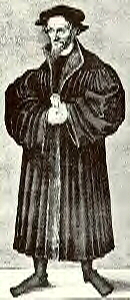| |
|
|
Melanchthon, Philipp
(1497 to 1560)
This was the way Johannes Reuchlin translated the family name Schwar(t)zerd(t) into Greek in 1510. The Reformator Philipp Melanchthon was born 16. February 1497 in Bretten and he died 19. April 1560 in Wittenberg.
After the death of Father Georg Schwartzerd (1507), who was a palatinate Blacksmith, Grandmother Elisabeth (a sister of Reuchlin) took her grandchildren and moved to her hometown Pforzheim. In Pforzheim she established close contact with Johannes Reuchlin. At the age of twelve Melanchthon signed up at Heidelberg University. He soon preferred teaching to sciences, and took the place of his professor to teach the count's sons.
 Melanchthon moved to Tübingen in 1512. Here he lived at the student’s hostel first as a student, after his masters as "Konventor". In Tübingen the humanist Johannes Reuchlin had much influence on Melanchthon. The Catholic Johannes Gerson also had an impact. Melanchthon himself stood out in Tübingen because of his prefaces to various schoolbooks, the writing of "Clarorum virorum epistolae" and his Terenz-edition, his first public speech, "De artibus liberalibus" and his first book, a Greek grammar. Melanchthon moved to Tübingen in 1512. Here he lived at the student’s hostel first as a student, after his masters as "Konventor". In Tübingen the humanist Johannes Reuchlin had much influence on Melanchthon. The Catholic Johannes Gerson also had an impact. Melanchthon himself stood out in Tübingen because of his prefaces to various schoolbooks, the writing of "Clarorum virorum epistolae" and his Terenz-edition, his first public speech, "De artibus liberalibus" and his first book, a Greek grammar.
Melanchthons sphere of activity dated back to his time in Wittenberg. In 1502 the University of Wittenberg was newly founded. The Saxon Prince Friedrich the Wise looked for someone to hold the new professorship for Greek and Hebrew and asked Reuchlin for a recommendation. Against the vote of Luther Melanchthon was appointed. Four days in town Melanchthon already lectured in 1518 about reforming the training system. Luther applauded his system of biblical humanism and both men became friends.
Between 1518 and 1521 Melanchthon turned to the theology of the Reformation. This became most obvious when Melanchthon accompanied Luther in 1519 to his famous disputes in Leipzig, when Johann Agricola conferred a baccalaureus biblicus on him and made him member of two Faculty at the same time (humanities and theology), when he turned his back on Aristoteles and when he wrote the first Evangelical dogmatic book "Loci communes" in 1521. This book is based on his lecture about Paul’s letter to Rome. It was the book most printed during the 16. century.
1521 and 1522 Melanchthon tried to link up theology and education influenced by the uprise of Wittenberg, the activities of the Zwickau Profeten and Luther being banned on Wartburg. His "Ratio discendi" must be interpreted in this context. During the following years Melanchthon wrote his first religious pedagogical books, e.g. the Catechism. When Luther no longer communicated with Erasmus of Rotterdam in 1525, Melanchthon still held contact with his long-time friend.
The Elector of Sachsen ordered Melanchthon to organise the church and schoolsytem in the electorate of Sachsen. In 1529 Melanchthon drafted the new order for schools (e.g. in Herzberg, Zwickau, Soest and Köln) and for universities (e.g.. in Wittenberg, Tübingen, Bonn and Königsberg). The following years Melanchthon represented Sachsen and the Evangelical stations at the German Reichstage (Speyer, Augsburg) and at religious disputes (e.g. in Marburg, Regensburg and Worms). He was the writer of Evangelical confessions (mainly the "Augsburg Confession") and of the "Apologie der Augsburgischen Konfession". In 1540 Melanchthon survived a life threatening disease and his friendship to Luther deepened.
Melanchthon has always been called "Praeceptor Germaniae". Some accused him of being shy, because Luther wrote to the Elector in 1530 "I cannot take my steps as soft" without taking into account that Luther meant his words as a compliment. Also Luther pointed out that he himself cannot better anything Melanchthon does. Others said that Melanchthon was the head of Philippism and accused him of being compliant.
But Melanchthon was an independent reformator and remained a humanist. His special achievement was to reorganise the church-, school- and university-system. He introduced religious lessons in school, was the first to write the Evangelical Catechism and stood up for the reformation in Europe.
Frauke Brauns, Bielefeld
|